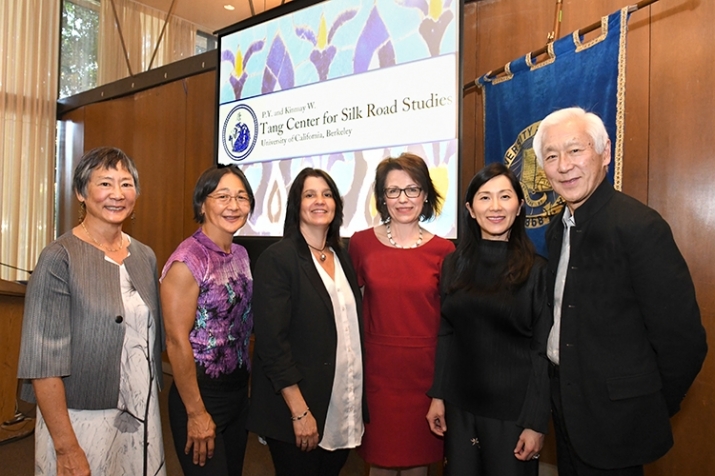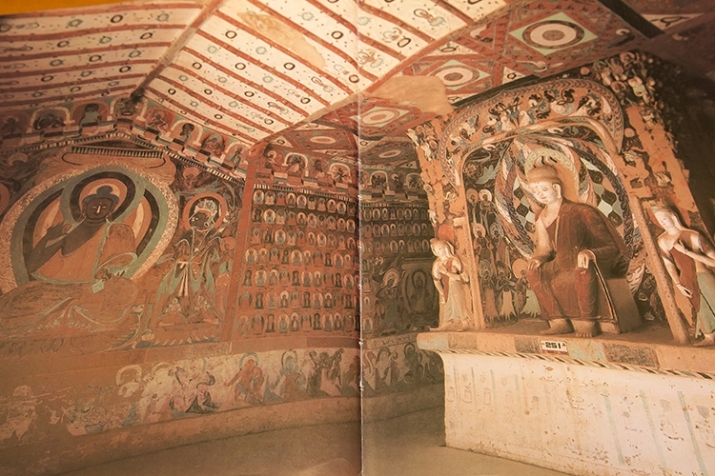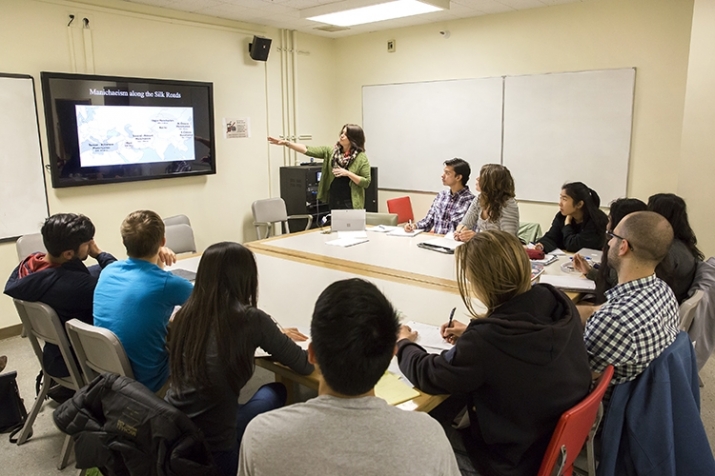NEWS
UC Berkeley Launches First Center for Silk Road Studies in the US
 From left to right, Nadine Tang, Leslie Schilling, Sanjyot Mehendale, Corinne Debaine-Francfort, Agnes Hsu-Tang and Oscar Tang. From news.berkeley.edu
From left to right, Nadine Tang, Leslie Schilling, Sanjyot Mehendale, Corinne Debaine-Francfort, Agnes Hsu-Tang and Oscar Tang. From news.berkeley.eduOn 29 April, the University of California, Berkeley, launched the P.Y. and Kinmay W. Tang Center for Silk Road Studies, the first university center in the United States dedicated to the study of the Silk Road, an ancient network of overland and maritime trade routes that enabled economic, religious, and cultural exchange across Eurasia.
The Tang family, relations of Chinese-American philanthropist Oscar Tang, donated US$5 million toward the creation of the center. The donation came from two branches of the family—Oscar Tang and his wife, archaeologist Dr. Agnes Hsu-Tang, based in New York, and Berkeley alumni Nadine Tang and Leslie Tang Schilling, with their brother Martin Tang, based in Hong Kong.
The center is the latest addition to the portfolio of Oscar Tang, who also founded the Tang Center for Excellence in Chinese Humanities, the P.Y. and Kinmay W. Tang Center for East Asian Art at Princeton University (both in 2003), and, together with Dr. Agnes Hsu-Tang, the Tang Center for Early China at Columbia University (in 2015).
According to Oscar Tang, the Silk Road Studies Center at UC Berkeley is “part of my family’s ongoing effort to enhance knowledge and understanding of the great Chinese civilization and its relationship to the rest of the world.” (Berkeley News)
 Remains of the Silk Road found in caves in western China. From news.berkeley.edu
Remains of the Silk Road found in caves in western China. From news.berkeley.eduThe Berkeley News report noted that the center would foster “the research and teaching of the material and visual cultures that flourished along the Silk Road and formed a bridge between the many economic epicenters of Eurasia and China. A better understanding of the Silk Road’s history will also help to contextualize its geopolitical significance in the present time.” In addition, “The center will fund fieldwork and fellowships for faculty and students at excavations, museums and archives; organize conferences and workshops to bring distinguished scholars to campus to share recent discoveries and research; advance teaching on Silk Road topics; foster visiting scholar exchanges; support open-source publications; and promote the training and outreach of K-12 teachers and community college instructors.” (Berkeley News)
The center’s multidisciplinary approach to Silk Road research is reflected in the advisory committee, which includes several UC Berkeley scholars—Sanjyot Mehendale, lecturer on Central Asian art and archaeology, who will serve as the chair of the center, Patricia Berger, professor of Chinese art, Jacob Dalton, professor of Tibetan Buddhism—and honorary advisers Francesco Bandarin, assistant director general for culture at UNESCO and humanitarian, and cellist Yo-Yo Ma.
 Sanjyot Mehendale, chair of the Silk Road center, teaches a class on Iranian art. From news.berkeley.edu
Sanjyot Mehendale, chair of the Silk Road center, teaches a class on Iranian art. From news.berkeley.edu“It’s about coming together and poring over material from different sides,” Mehendale explained. “You can’t just sit in your corner of expertise. You have to look at the art, you have to study the texts, you have to examine the archaeological remains, to build a bigger picture. The more we understand the history of the region, in particular Central Asia, the more it will resonate as a place, as cultures, as people.” (Berkeley News)
UC Berkeley is home to a diverse group of scholars, leading specialists in the fields of languages, history, religion, and the intellectual and artistic traditions of the ancient civilizations of China, Central Asia, and the Near East. The Center for Silk Road Studies will make a natural site for a specialized program dedicated to studying the Silk Road.
As Robert Sharf, a professor of Buddhist Studies at UC Berkeley, observed, “The civilizations of the ancient Near East, South Asia, and East Asia all came together and interacted along the thriving urban centers of the Silk Road, giving rise to marvelously sophisticated and innovative cultural achievements. . . . The more you learn about that world, the more humble you are. It puts the cultural hubris of our modern world—the idea that we stand at the very apex of human self-understanding—into context.” (Berkeley News)
See more
UC Berkeley to open first university center for Silk Road study in North America (Berkeley News)
Berkeley opens first center in US on study of Silk Road (China Daily)
Related news from Buddhistdoor Global
17th Century Buddhist Monk May Offer a Path to Stronger China-Japan Relations
Related features from Buddhistdoor Global
Buddhistdoor View: Buddhist Hopes for China’s Silk Road Initiative














